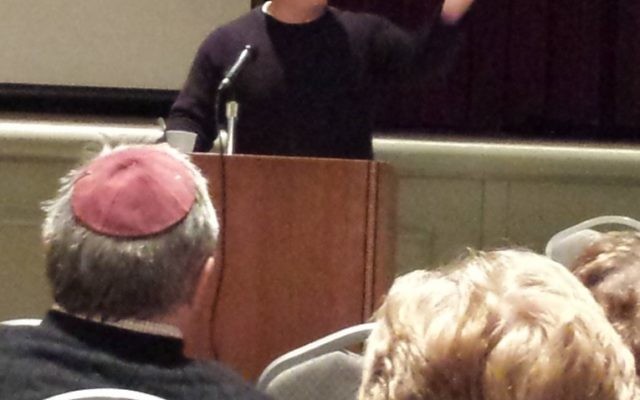Etgar 36 Challenges Comfortable Assumptions
Teen tour group Etgar 36 celebrated its bar mitzvah Saturday night, Jan. 31, at Ahavath Achim Synagogue, commemorating 13 years since the educational and politically themed program set off on its first summer excursion in 2003.
Founder and Director Billy Planer thanked those responsible for the fruition and functioning of Etgar 36 and asked each group to rise, beginning with his parents and continuing through sponsors, past participants and supporting staff.

Etgar 36 founder Billy Planer discusses the ideas about experiential education behind his organization.
In addition to the summer trips, Etgar 36 offers two civil rights journeys for youth groups, schools, adult groups and groups of friends from September to May. One trip heads to Atlanta, Montgomery, Selma and Birmingham, while the other goes to Memphis, adding in the history of rock ’n’ roll.
Etgar, the Hebrew word for challenge, describes the way the teens are challenged to critically evaluate their own opinions and those of others.
The number 36 is double the value of chai, the Hebrew word for life, representing the dual identity of American Jews. Leading this type of double life presents its own set of challenges, ones that Planer charges his participants to consider.
He explained his belief in experiential education, which in this case consists of traveling to sites of historical or political importance and speaking with people and organizations that represent different sides of issues, as well as people who were involved in the important events.
To Planer, good experiential education should challenge people to leave their comfort zones. “On Etgar 36 we are teaching teens and adults to think,” he said. “This means they should be … made uncomfortable, made to struggle.”
“What’s incredibly powerful about programs like Etgar 36 … is the fact that Billy takes kids out on the road to hear personal stories,” said Julie Rhoad, the CEO of the AIDS Memorial Quilt. “That young people learn from these personal stories I think is some of the most powerful education you can give.”
The bar mitzvah celebration included the screening of Etgar 36’s first documentary, produced by a participant of one of Planer’s civil rights trips, Brian Overbye. The film aims to provide a window into the educational philosophy and to capture the elements that make the trip unique.
The film opens up with a shot of Planer addressing the summer 2014 group before it sets out on its journey. “I give you permission to leave school behind and spend a few weeks saying what’s on your mind, not what you think I want to hear,” he says.
With that declaration reverberating throughout the program, the group in the film hears from an array of speakers, including gun rights lobbyist Clark Aposhian; Rabbi Mark Borovitz of Beit T’Shuvah, a synagogue for recovering addicts; Martha Hawkins, who braved internal and external opposition in opening her own restaurant in Montgomery, Ala.; and conservative activist Jim Pfaff, who speaks out against same-sex marriage.
“We emphasize the importance of talking to people you disagree with,” Planer said. “What’s the point of only talking and listening to people who … think like you?”
The teens in the film are asked to consider weighty material, such as the juxtaposition of Aposhian’s presentation with that of Tom Mauser, whose son Daniel was killed in the Columbine shooting.
“Part of my core educational philosophy is to show that there’s something to be gotten from everything,” Planer said.
The documentary was followed by a panel composed of Aposhian, Pfaff, Rabbi Borovitz and Hawkins, asked primarily to recount their respective impressions of the teens and their questions. Although a diverse group, all agreed that the teens had touched their lives in ways they would never forget.




comments